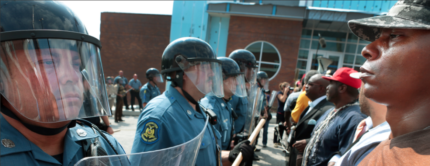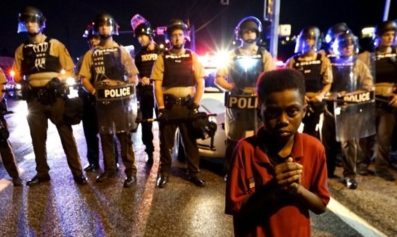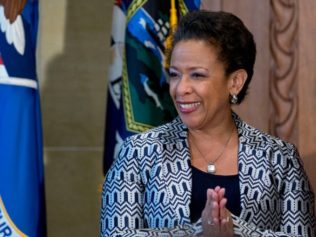As the fires smolder in Ferguson and the broken glass glistens in the light of day, Ferguson police officer Darren Wilson was able to awake in his bed still a free man after a St. Louis grand jury decided not to indict him for killing 17-year-old Michael Brown in August.
There was violence and looting in Ferguson last night, buildings and cars set on fire, gunshots ringing out, windows smashed and a sense of rage in the streets. Surely the residents of Ferguson expected this verdict from the grand jury, but that made their anger no less profound.
But because most observers expected that Wilson would go free, particularly after months of leaks from the grand jury proceedings made it plan that’s where the case was headed, many questions last night focused on the strange decision-making of St. Louis officials to schedule the announcement for the middle of the night, the time when it was most likely to lead to violence and chaos.
After months of handwringing that the Black community in Ferguson would erupt in anger if a grand jury decision let Wilson walk free, St. Louis County prosecutor Bob McCulloch last night waited until the dark of night to announce that the grand jury had indeed decided not to indict Wilson.
Predictably, the announcement was followed by unrest on the streets of Ferguson, as an enormous media phalanx showed up to document every rock thrown by Ferguson residents.
Legal analysts seemed stunned by the sequence of events—not by the grand jury decision itself, but how the decision so closely mirrored the leaks that had dribbled out of the prosecutor’s office over the last few months. McCulloch made the bizarre decision to stand before a microphone and read the entire decision, talking about “conflicting” evidence and taking nearly 30 minutes to even get to the grand jury decision, pushing the actual news in the announcement until nearly 8:30 pm Central time.
Commentators one after another were left with the conclusion that St. Louis officials had choreographed events to create the most pregnant possibility for violent protest. That was the only way to analyze what happened last night. If not that, then we saw one of the most severely mismanaged major public events in recent memory.
When Missouri Gov. Jay Nixon was asked by reporters at a news conference why the announcement was made so late, especially considering that so much of the violent clashes between protesters and the police in August happened late at night, the governor shrugged his shoulders and said he didn’t know. He said the decision had been made the the prosecutor, McCulloch—suggesting that there was no coordination between the leaders of a state that for months had been anxiously awaiting this event and allegedly planning for it.
As experts pointed out, the difference between an announcement during the day and at night is enormous. The daytime would have seen peaceful protests by the committed activists who have been planning and coordinating for months. But those people are not likely to stick around late into the night, when the scene will be taken over by younger forces more intent on expressing their rage and frustration than aligning themselves with the long history of peaceful protest in the U.S.
By the end of the night, police said 29 people had been arrested, more than a dozen businesses had been badly damaged or destroyed, and police officials said the final carnage was worse than it had ever gotten during the weeks of protesting in August right after the shooting.
The outraged reactions were not confined to Ferguson. From Los Angeles to New York, Atlanta to Philadelphia, thousands of people flowed into the street to protest the grand jury decision.
“Everybody is frustrated,” Hugh Jackson, 28, who just moved to New York from Atlanta and wore an American-flag-print bandanna over his mouth as he passed Carnegie Hall, told the New York Times. He referred to the killing of Akai Gurley last week by a New York police officer who said he accidentally discharged his gun in the stairwell of a Brooklyn housing project and said that “you’re kind of numb to it at a certain point. It’s so systematic.”
In South Los Angeles, a crowd of protesters chanted, “From Ferguson to L.A., these killer cops have got to pay,” according to the Times.
Beyond the angry reactions, experts were stunned by the strange grand jury process McCulloch used, throwing a mountain of evidence at the grand jury without directing them with specific charges, then allowing leaks to poison the minds of grand jury members who went home and lived their normal lives in between the weekly meetings.
Paul Butler, a professor at Georgetown University Law Center, said on MSNBC that McCulloch did not conduct a “good faith” investigation.
“I’ve appeared before grand juries a hundred times,” he said. “I’ve never seen a process like this. It really did feel as if the fix was in. And that’s the tradition with this prosecutor. He’s 0-5 in cases he’s taken to the grand jury of cops who shot unarmed people. That matches the tradition in our country of African-Americans getting over-enforcement of the law when African-Americans are suspects and under-enforcement when African-Americans are victims. It seems as if an unarmed African-American man or woman has no rights a white cop is bound to respect.”

“We wouldn’t be the land of mass incarceration if every case was treated the way this case was treated,” she said on MSNBC. “Conflicting evidence means you can’t even charge a man? That was so outrageous and disturbing to me. He rigged the system to get the result he wanted. He never explained why Officer Wilson feared for his life.”
The grand jury announcement was accompanied by the release of hundreds of pages of documents from the grand jury proceedings, including the testimony of Wilson himself. He described Brown as being the aggressor throughout the confrontation, even after Wilson had gotten out of the police car and shot him.
“He grabs my gun, says, ‘You are too much of a pussy to shoot me,'” Wilson told the grand jury about his confrontation with Brown inside the police car. “The gun goes down into my hip and at that point I thought I was getting shot. I can feel his fingers try to get inside the trigger guard with my finger and I distinctly remember envisioning a bullet going into my leg. I thought that was the next step.”
“Like I said, I was just so focused on getting the gun out of me. When I did get it up to this point, he is still holding onto it and I pulled the trigger and nothing happens, it just clicked. I pull it again, it just clicked again,” Wilson said. “At this point I’m like why isn’t this working, this guy is going to kill me if he gets ahold of this gun. I pulled it a third time, it goes off. When it went off, it shot through my door panel and my window was down and glass flew out of my door panel. I think that kind of startled him and me at the same time…The only way I can describe it, it looks like a demon, that’s how angry he looked. He comes back towards me again with his hands up.”
This is how Wilson described the last seconds of Brown’s life, after he chased him down the street:
“So when he stopped, I stopped. And then he starts to turn around, I tell him to get on the ground, get on the ground. He turns, and when he looked at me, he made like a grunting, like aggravated sound and he starts, he turns and he’s coming back towards me. His first step is coming towards me, he kind of does like a stutter step to start running. When he does that, his left hand goes in a fist and goes to his side, his right one goes under his shirt in his waistband and he starts running at me. At this point it looked like he was almost bulking up to run through the shots, like it was making him mad that I’m shooting at him. And the face that he had was looking straight through me, like I wasn’t even there, I wasn’t even anything in his way. And when he gets about that 8 to 10 feet away, I look down, I remember looking at my sites and firing, all I see is his head and that’s what I shot.”
“I don’t know how many, I know at least once because I saw the last one go into him,” Wilson said. “And then when it went into him, the demeanor on his face went blank, the aggression was gone, it was gone, I mean I knew he stopped, the threat was stopped.”
Benjamin Crump, attorney for the Brown family, said he was “profoundly disappointed” by the decision. He said he and his colleagues will sit down with the Brown family and talk about pursuing a civil lawsuit against Wilson for violating Brown’s civil rights.
“Thy wanted the killer of their unarmed son to be held accountable, as any parents would have wanted,” Crump said. “They don’t want people just making noise. They wanted to make a difference.”
Though Michael Brown Sr. released a videotape asking for the community for calm—a statement that was repeated by both President Obama and Attorney General Eric Holder yesterday in their reactions to the verdict—Brown’s stepfather Louis Head didn’t share that sentiment. As Brown’s mother Lesley McSpadden cried after hearing McCulloch read the verdict while they stood with protesters outside the barricaded Ferguson police station, Head stomped angrily and repeatedly shouted, “Burn this bitch down!”
Marcia Fudge (D-Ohio), chair of the Congressional Black Caucus called the decision “a miscarriage of justice.”
“It is a slap in the face to Americans nationwide who continue to hope and believe that justice will prevail,” she said in a statement. “This decision seems to underscore an unwritten rule that Black lives hold no value; that you may kill Black men in this country without consequences or repercussions. This is a frightening narrative for every parent and guardian of Black and brown children, and another setback for race relations in America.”


